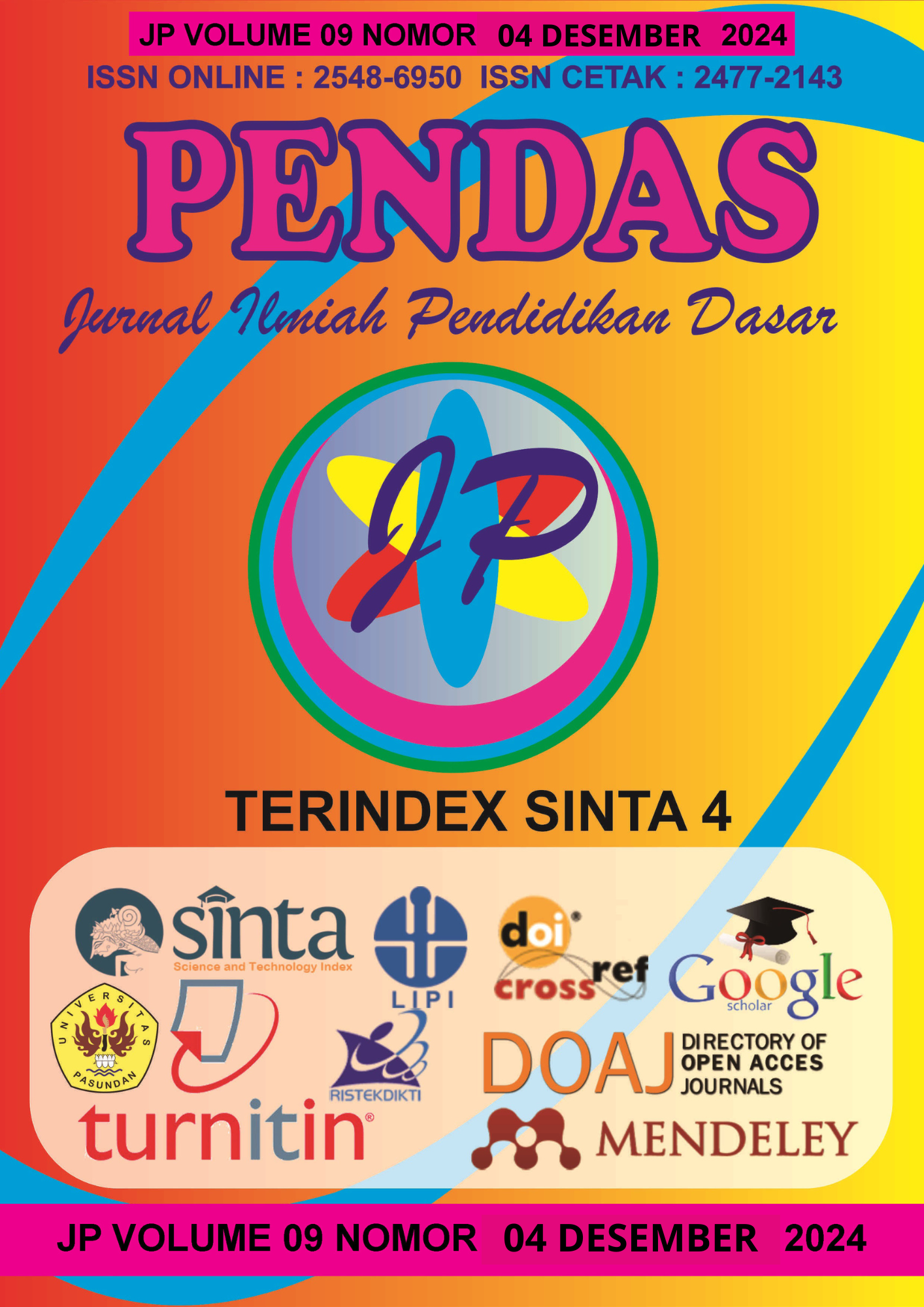EFEKTIVITAS PENGGUNAAN APLIKASI KHAN ACADEMY KIDS DALAM PENGENALAN KOSAKATA BAHASA INGGRIS PADA ANAK USIA 5 - 6 TAHUN DI TAMAN KANAK - KANAK DEK PADANG
DOI:
https://doi.org/10.23969/jp.v9i04.19570Keywords:
Early childhood, Aplication, English VocabularryAbstract
This study aims to assess the effectiveness of using Khan Academy Kids app in teaching English vocabulary in the DEK Padang kindergarten. This study uses a quasi-experimental method with a quantitative approach. This study includes all children in the DEK Padang kindergarten as the research population, with group B3 as the control group and group B1 as the experimental group, each consisting of 15 children. The data collected in this study comes from tests as well as observations. The data were analyzed using normality tests, homogeneity tests, hypothesis tests, and effect size tests. The analysis results show that the experimental group achieved a pre-test score of 9.6 and the control group a score of 9.5, while the average post-test score of the experimental group was 14.2 and that of the control group was 13.6. The results indicate a normal and homogeneous distribution. The hypothesis test yielded a significance value (2-tailed) of 0.029 < 0.05. An effect size of 3.07 falls into the strong category. Therefore, it is concluded that using the Khan Academy Kids app is effective in introducing children to the English vocabulary.Downloads
References
Al-Harbi, S. S. (2020). Language development and acquisition in early childhood. Journal of Education and Learning (EduLearn), 14(1), 69–73. https://doi.org/10.11591/edulearn.v14i1.14209
Fadilah, A., Nurzakiyah, K. R., Kanya, N. A., Hidayat, S. P., & Setiawan, U. (2023). Pengertian Media, Tujuan, Fungsi, Manfaat dan Urgensi Media Pembelajaran. Journal of Student Research (JSR), 1(2), 1–17.
Hidayati, N. N. (2017). Meningkatkan Kosakata Bahasa Inggris Anak Usia Dini dengan Kartu Bergambar. Al-Hikmah : Indonesian Journal of Early Childhood Islamic Education, 1(1), 67–86. https://doi.org/10.35896/ijecie.v1i1.6
Holzberger, D., Philipp, A., & Kunter, M. (2013). How Teachers’ Self-Efficacy Is Related to Instructional Quality: A Longitudinal Analysis. Journal of Educational Psychology, 105(03), 774–786. https://doi.org/10.1037/a0032198
Junaida, J., & Zannah, M. (2023). Upaya Meningkatkan Penguasaan Kosa Kata Bahasa Inggris Anak Usia 5-6 Tahun Melalui Media Audio Visual Di Ra Babussalam T.a 2019/2020. MUDABBIR Journal Reserch and Education Studies, 1(1), 38–50. https://doi.org/10.56832/mudabbir.v1i1.5
Mailani, O., Nuraeni, I., Syakila, S. A., & Lazuardi, J. (2022). Bahasa Sebagai Alat Komunikasi Dalam Kehidupan Manusia. Kampret Journal, 1(1), 1–10. https://doi.org/10.35335/kampret.v1i1.8
MARAGKOPOULOU, K. (2021). Digital Media and English Language Development of Dual Language.
Marlianingsih, N. (2016). Pengenalan Kosa Kata Bahasa Inggris Melalui Media Audio Visual (Animasi) Pada Paud. Faktor Jurnal Ilmiah Kependidikan, 3(2), 133–140.
Nurzakiyah, K. R., Kanya, N. A., Hidayat, S. P., & Setiawan, U. (2023). Pengertian Media, Tujuan, Fungsi, Manfaat dan Urgensi Media Pembelajaran. Journal of Student Research (JSR), 1(2), 1–17.
Pamungkas, Z. B., & Amin, R. F. (2021). Peran Pendidikan Bahasa Inggris Untuk Anak Di Usia “Golden Age.” Islamic Elementary School (IES), 2(1), 171–195. http://jurnal.iairm-ngabar.com/index.php/ies/article/view/279
Siyoto, S., & Sodik, A. (2015). DASAR METODOLOGI PENELITIAN. Literasi Media Publishing.
Sugiono. (2019). Metode Penelitian Pendidikan (2019th ed.). Alfabeta. www.cvalfabeta.com
Vnucko, G., & Klimova, B. (2023). Exploring the Potential of Digital Game-Based Vocabulary Learning: A Systematic Review. Systems, 11(2), 1–18. https://doi.org/10.3390/systems11020057
Downloads
Published
Issue
Section
License
Copyright (c) 2024 Pendas : Jurnal Ilmiah Pendidikan Dasar

This work is licensed under a Creative Commons Attribution 4.0 International License.



















